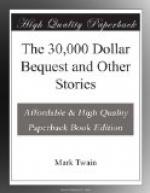As time is measured in America, McClintock’s epoch is antiquity. In his long-vanished day the Southern author had a passion for “eloquence”; it was his pet, his darling. He would be eloquent, or perish. And he recognized only one kind of eloquence—the lurid, the tempestuous, the volcanic. He liked words—big words, fine words, grand words, rumbling, thundering, reverberating words; with sense attaching if it could be got in without marring the sound, but not otherwise. He loved to stand up before a dazed world, and pour forth flame and smoke and lava and pumice-stone into the skies, and work his subterranean thunders, and shake himself with earthquakes, and stench himself with sulphur fumes. If he consumed his own fields and vineyards, that was a pity, yes; but he would have his eruption at any cost. Mr. McClintock’s eloquence —and he is always eloquent, his crater is always spouting—is of the pattern common to his day, but he departs from the custom of the time in one respect: his brethren allowed sense to intrude when it did not mar the sound, but he does not allow it to intrude at all. For example, consider this figure, which he used in the village “Address” referred to with such candid complacency in the title-page above quoted—“like the topmost topaz of an ancient tower.” Please read it again; contemplate it; measure it; walk around it; climb up it; try to get at an approximate realization of the size of it. Is the fellow to that to be found in literature, ancient or modern, foreign or domestic, living or dead, drunk or sober? One notices how fine and grand it sounds. We know that if it was loftily uttered, it got a noble burst of applause from the villagers; yet there isn’t a ray of sense in it, or meaning to it.
McClintock finished his education at Yale in 1843, and came to Hartford on a visit that same year. I have talked with men who at that time talked with him, and felt of him, and knew he was real. One needs to remember that fact and to keep fast hold of it; it is the only way to keep McClintock’s book from undermining one’s faith in McClintock’s actuality.
As to the book. The first four pages are devoted to an inflamed eulogy of Woman—simply woman in general, or perhaps as an institution —wherein, among other compliments to her details, he pays a unique one to her voice. He says it “fills the breast with fond alarms, echoed by every rill.” It sounds well enough, but it is not true. After the eulogy he takes up his real work and the novel begins. It begins in the woods, near the village of Sunflower Hill.
Brightening clouds seemed to rise from the mist of the fair Chattahoochee, to spread their beauty over the thick forest, to guide the hero whose bosom beats with aspirations to conquer the enemy that would tarnish his name, and to win back the admiration of his long-tried friend.




